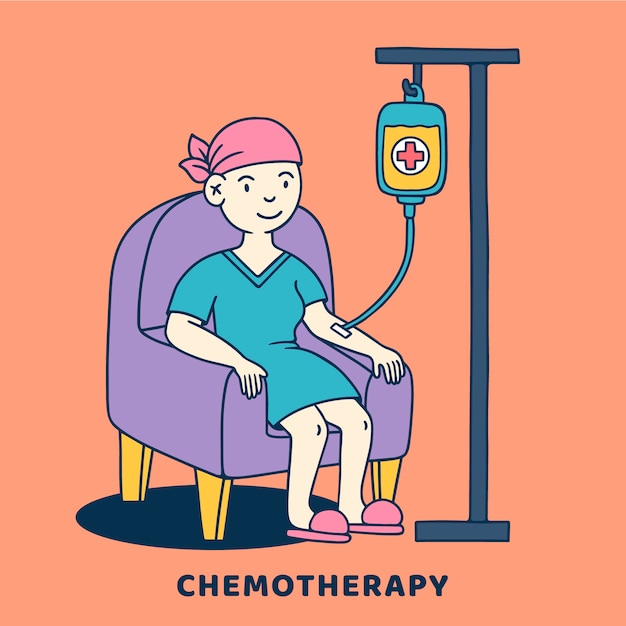
- Nausea and vomiting: Some chemotherapy drugs can trigger nausea and vomiting, although anti-nausea medications can help manage these symptoms.
- Hair loss: Chemotherapy often leads to temporary hair loss, including scalp, facial, and body hair.
- Fatigue: Many people experience fatigue during chemotherapy, which can affect daily activities and energy levels.
- Weakened immune system: Chemotherapy can lower the body’s white blood cell count, increasing the risk of infections.
- Loss of appetite: Some people undergoing chemotherapy may experience a reduced appetite or changes in taste preferences.
- Mouth sores: Chemotherapy can cause irritation and sores in the mouth and throat, making it difficult to eat and swallow.
- Changes in bowel habits: Chemotherapy can lead to diarrhoea or constipation.
- Nerve damage: Certain chemotherapy drugs can cause peripheral neuropathy, resulting in tingling, numbness, or pain in the hands and feet.
- Increased risk of bruising and bleeding: Chemotherapy can lower the body’s platelet count, leading to easy bruising and bleeding.
- Changes in fertility: Certain chemotherapy drugs can affect fertility in both men and women, potentially leading to temporary or permanent infertility.
- Skin and nail changes: Chemotherapy can cause dryness, itching, rash, and changes in skin pigmentation. Nails may become brittle or develop lines.
- Anaemia: Some chemotherapy drugs can lower red blood cell counts, leading to anaemia, which can cause fatigue, weakness, and shortness of breath.
- Mood changes: Chemotherapy may affect mood and emotions, leading to feelings of anxiety, depression, or mood swings.
- Memory and concentration problems: Some people undergoing chemotherapy may experience difficulties with memory, concentration, and cognitive function, often called “chemo brain.”
- Muscle and joint pain: Chemotherapy can cause muscle and joint pain, stiffness, and discomfort.
- Weight changes: Some individuals may experience weight gain or weight loss during chemotherapy treatment.
- Heart and lung problems: Certain chemotherapy drugs can affect the heart and lungs, leading to conditions such as cardiomyopathy or pulmonary toxicity.
- Hormonal changes: Chemotherapy can disrupt hormone levels in the body, leading to symptoms such as hot flashes, menstrual changes, or sexual dysfunction.
- Eye problems: Chemotherapy may cause dry eyes, sensitivity to light, or vision changes.
- Increased risk of secondary cancers: In some cases, chemotherapy treatment may increase the risk of developing other types of cancer later in life.
- Fluid retention: Some chemotherapy drugs can cause fluid retention, leading to swelling in the hands, feet, or legs.
- Liver and kidney problems: Certain chemotherapy drugs can affect liver and kidney function, potentially leading to liver damage or kidney impairment.
- Changes in blood sugar levels: Chemotherapy may cause fluctuations in blood sugar levels, leading to hyperglycemia (high blood sugar) or hypoglycemia (low blood sugar).
- Changes in taste and smell: Chemotherapy may alter the sense of taste and smell, leading to food aversions or changes in the perception of flavours.
- Emotional distress: Coping with a cancer diagnosis and undergoing chemotherapy can cause emotional distress, anxiety, and depression in some individuals.
- Sleep disturbances: Chemotherapy may disrupt sleep patterns, leading to insomnia or excessive daytime sleepiness.
- Infertility: Certain chemotherapy drugs can impact fertility in both men and women, potentially leading to temporary or permanent infertility.
- Bone density loss: Some chemotherapy drugs can contribute to bone density loss, increasing the risk of osteoporosis or bone fractures.
- Digestive issues: Chemotherapy can lead to gastrointestinal symptoms such as indigestion, bloating, and abdominal discomfort.
- Fluid accumulation in the lungs (pulmonary oedema): Some chemotherapy drugs may cause fluid to build up in the lungs, leading to difficulty breathing and coughing.
- Changes in blood pressure: Certain chemotherapy drugs may affect blood pressure levels, causing hypertension (high blood pressure) or hypotension (low blood pressure).
- Changes in blood clotting: Certain chemotherapy drugs can interfere with blood clotting mechanisms, increasing the risk of blood clots or bleeding disorders.
- Peripheral oedema: Chemotherapy can cause fluid retention in the extremities, leading to swelling in the hands, feet, ankles, or legs.
- Changes in lung function: Certain chemotherapy drugs may impair lung function, leading to shortness of breath, coughing, or wheezing.
- Changes in metabolism: Chemotherapy treatment may alter metabolism, leading to changes in energy levels, appetite, and weight.
Conclusion:
To properly treat these side effects, chemotherapy patients should schedule routine check-ups with their medical team. Since some side effects might be dangerous, they should also report any new or worsening symptoms.
